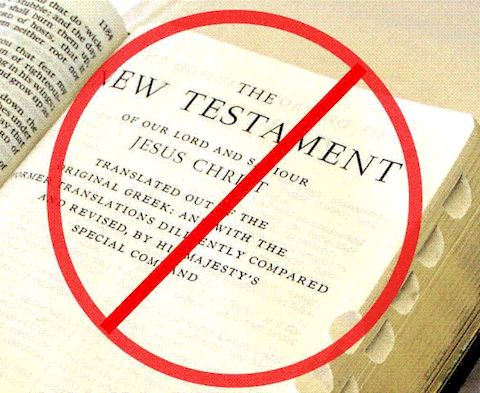
1001 Errors in the Christian Bible
Home
Dedication
Matthew
Mark
Luke
John
Acts
Contact Us
Matthew -- Errors 22-28
#22
Matthew 1: (KJV)
20…”for that which is conceived in her is of the Holy Ghost.”
Same error as #18. There is no “the” before “Holy Ghost”
in the Greek. Of the major translations only Darby acknowledges this,
“for that which is begotten in her is of [the] Holy Spirit”.
#23
Matthew 1: (KJV)
20…”for that which is conceived in her is of the Holy Ghost.”
In the Greek “spirit”(ghost) comes before “holy” and
is separated by the verb “to be”. A literal translation is “for
that which is conceived in her from spirit is holy”.
No mention of this in the major Christian translations. Again, Christian
translators are creating support for their idea of the holy ghost as a
separate person in their translations.
#24
Matthew 1: (KJV)
21 “And she shall bring forth a son, and thou shalt call his name
JESUS: for he shall save his people from their sins.”
False prophecy. Everyone agrees that for two thousand years most Jews
have died not believing in Jesus and therefore, according to Christian
theology, were not saved from their sins.
#25
Matthew 1: (KJV)
22 “Now all this was done, that it might be fulfilled which was
spoken of the Lord by the prophet, saying, 23 Behold, a virgin shall be
with child, and shall bring forth a son, and they shall call his name
Emmanuel, which being interpreted is, God with us.”
If you’re trying to make a list of 1001 errors in the Christian Bible
then Matthew 1:22-23
is, as Banta said to Jerry Seinfeld, “Gold, Jerry! Gold!”. The
“prophecy fulfillment” of sentences 22 and 23 is out of place
as the fulfillment happens in the following sentences 24 and 25. Joseph
is just dreaming in sentences 20 and 21 and wakes up from this dream in
sentence 24. It’s likely that sentences 22 and 23 were later additions
to the original text. Since the time of Irenaeus Christian commentators
have “explained” that the formula citation was spoken by the
angel of sentence 21.
#26
Matthew 1: (KJV)
23 “Behold, a virgin shall be with child,”
It’s undisputed that the Hebrew text has the definite article “the”
instead of “a” before “young woman” (KJV’s “virgin”).
A slim majority of major Christian translations now have “the”
here instead of “a”. The use of the definite article “the”
means that the woman in question was known to the speaker of the prophecy,
Isaiah, and could not be referring to someone who lived about 700 years
later.
#27
Matthew 1: (KJV)
22 “Now all this was done, that it might be fulfilled which was
spoken of the Lord by the prophet, saying, 23 Behold, a virgin”
Matthew 1:23 uses the Greek word “parthenos” which has a primary
meaning of “virgin”. The Hebrew word from Isaiah 7:14 that Matthew
is referring to is “almah” which has a primary meaning of “young
woman” according to all Jewish Bible scholars, virtually all Hebrew/English
dictionaries, most Christian Bible scholars and the majority of modern
Christian Bible translations. The Greek word “neanis” has a
primary meaning of “young woman”. When the RSV first translated
Isaiah 7:14 as “young woman” it was burned in several parts
of the country by Christian fundamentalists. On a humorous note, even
though the Catholic translators of the NAB had decided to translate Isaiah
7:14 as “young woman”, the American Bishops voted to use “virgin”
instead. I guess they thought “it was the Christian thing to do.”
#28
Matthew 1: (KJV)
23 “Behold, a virgin shall be with child”
In the Hebrew, the verb for “shall be with child”, “harah”,
is in the present tense. The proper translation of Isaiah 7:14 from Hebrew
should be, “Look, the young woman is with child”.
We Shape A Human Form
Know what is above you.” And what is this that is above you? The
prophet Ezekiel said: “And upon the likeness of the throne was a
likeness as the appearance of a man upon it above.”How can this be
said of God? For is it not written; “To whom then will ye liken Me,
that I should be his equal?” But the truth of the matter is that
the “likeness as the appearance of man” is wrought by us. It
is the form we shape when we serve with true and fervent hearts. Such
service shapes a human form for our Creator, to whom no one is like or
equal; it shapes him, blessed be he and blessed be his name, in the semblance
of man. When a man is charitable and gives a service of love, he contributes
to the form of God’s right hand. And when a man fights in the ranks
of God and drives evil away, he contributes to the form of his left hand.
He who is above you on the throne-his shape is your work.